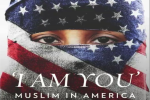On Thursday, February 26, Senator Jon Kyl (R-AZ) welcomed Dutch Parliamentarian Geert Wilders and sponsored a viewing of his short film Fitna. Muslimah feminists Irshad Manji and Daisy Khan were on CNN commenting on the issue, specifically whether or not Geert Wilders should be welcomed by our government and how it impacts Muslims. You can see the movie here.
We have two Muslim women on CNN, commenting on something that is not the headscarf! We have two Muslim women speaking about politics (still very much a man’s domain). Regardless of whether or not we agree with them, we have two educated, professional, successful Muslim women expressing their own opinions. Regardless of what we may think of either of them, we have two Muslim women publicly talking about their faith.
I’m not a fan of Manji’s, so I had my reservations before watching the interview. As expected, she did use the opportunity to promote her own mantra of “Muslims don’t accept diversity and I’m living proof of it.” However, her response was articulate and her delivery forceful. And Daisy Khan obliterates the debate when she calls Wilder intellectually dishonest because he wants to ban the Quran, yet calls for free speech. Irshad contends and says Fitna gives freedom of expression a bad name.
This video is rather groundbreaking for a major American network because it shows Muslim women as regular Americans with an opinion about issues in the American media. It sends a powerful message: Muslim women are sought out to speak about issues that affect Muslims. As a community, we need to promote and encourage each other–men and women–to take an active presence in the public sphere, even if we do not necessarily agree with each other.
Manji and Khan are being represented as credible spokespersons on matters concerning the Muslim community; this is most obviously a success for women, especially because the issue at hand is not specifically a feminist one, but the Muslim community as a whole clearly benefits when women are represented as being engaged in matters that effect Muslims. The fact that Manji and Khan also spoke about freedom of speech and human rights, issues that affect everyone no matter their religion or gender, is a slap in the face to critics who are so fixated on what they deem to be the oppressive state of women in Islam. At the same time, it was hard for me to watch this video without assuming that Khan and Manji would have to hurdle a question or two about “women in Islam.” I was relieved and a little surprised that no such question was raised.
I watched this video with my father, and he wondered why there were no Muslim men present, or why there wasn’t one female guest and one male guest. I thought it was an interesting observation and it made me wonder about the significance of the segregation of sexes in Islam. By only making the platform available to women, do we pose the risk of inadvertently sending a message about Islamic culture? It is true that Manji and Khan spoke about freedom of speech and human rights, but does their identification as Muslim women inadvertently illicit questions or observations from viewers about women’s rights in Islam? Let’s be honest, intentionally or not, CNN was showing a liberal viewpoint of women in Islam. This is obvious from their choice of guests, Manji much more controversial than Khan, but both western-educated and unveiled. Still, this video is successful in showing that Muslim women can partake in mature, thoughtful debate about issues in the news.
I liked how this interview stayed on topic and didn’t vilify either woman. It wasn’t set up to paint Manji as an outsider and Khan as a role model for example. In fact, while disagreeing on specific points, both women presented a united front by agreeing that Wilder’s film does freedom of speech a disservice. The only hint of any rivalry of the “who’s a better Muslimah,” or who’s version of Islam is right” kind, was brought up by Manji when she said, “And I speak very much within the faith of Islam,” before discussing her viewpoint. An acute observer or anyone who knows anything about Manji, a lesbian and critic of traditional mainstream Islam, would assume that she is shunned by many members of her community. Once again, kudos to CNN for staying away from this angle, as it detracts from the significance of the interview.
When educated and articulate Muslim women are being consulted on matters of faith, it shows Islam does not favor men or stifle women, as is often portrayed in the media. When guests are invited in the media, they should be balanced and bring people who can comment on Islam, and that includes women. Doing so defies the media’s fixation on women in Islam as oppressed, underrepresented beings. It also brings much needed focus back to the root of the problem and suggests that just as in the history of Judeo-Christian societies, when women in Islamic societies are oppressed, it is the outcome of an unequal society, not the majority religion.

